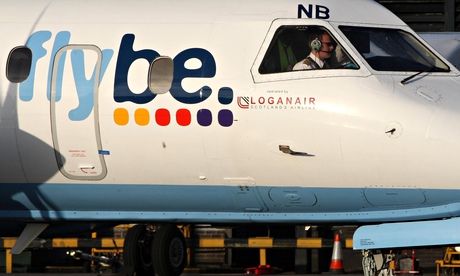
Flybe's finances have returned to the black, after the regional airline turned around large losses after a painful period of restructuring.
Record numbers of passengers in the UK and fuller planes boosted a more efficient business at home, while its business operating planes for Finnair drove revenues abroad. Saad Hammad, its chief executive, said the results marked "the rebirth of Flybe".
Costs dropped 3.3% and the airline turned a profit of £8.1m for the year, after losses of £41.1m in 2012-13. The Exeter-based airline was severely dented by the economic downturn and implemented a turnaround plan, including widespread redundancies and pay cuts, in January 2013.
Hammad said the return to scheduled flights to London from October, this time at City airport, was a mark of Flybe's revival – and he took a swipe at Gatwick, where Flybe was forced to sell its 25 pairs of arrival and departure slots last year, saying City was a better deal and better located for his eight million regional customers who need to connect to the capital. "No one wants to fly into Heathrow or Sussex. Our business is all about time-saving travel. We're competing against road and rail," he said.
Flybe has been hit hard by air passenger duty, which is payable only on flights taking off in the UK – and therefore often for both legs of its return flights, as a domestic carrier. Hammad said: "We can't control it – it's a nonsensical tax – but we can control costs. There's still lots to do; we must remain disciplined and level-headed – it's a long journey ahead. But we've stabilised the business and started to implement our growth strategy. We're really on track."
He said Flybe was still in talks with a number of European flag carriers to expand its "white label" business – operating planes for other carriers – which has performed well with Finnair, operating 22 regional routes into the Helsinki hub. "The carriers all have generically the same need: they either have to withdraw from the regions or stay under their brand and outsource," said Hammad. But he admitted it would take some time before similar ventures would be established.
Hammad said he gave heartfelt thanks to staff for "a phenomenal effort in effecting the transformation", including to those who had been made redundant. "It's not been easy – both leaving and being left behind. We had to do all those difficult things to secure the future of our company. We've had to lose 1,100 people but we've secured the future for 2,800 people."
Responding to the results, the British Airline Pilots' Association general secretary, Jim McAuslan, said: "Pilots have made huge sacrifices to help Flybe turn a corner, with more than 170 colleagues losing their jobs. What pilots want now is a clear direction, consistently applied and a fair sharing of the upside."

